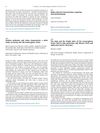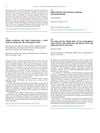 2 citations,
July 2022 in “Cell Regeneration”
2 citations,
July 2022 in “Cell Regeneration” Understanding hair growth involves complex factors, and more research is needed to improve treatments for hair loss conditions.
[object Object]  1 citations,
January 2024 in “Cellular & Molecular Biology Letters”
1 citations,
January 2024 in “Cellular & Molecular Biology Letters” Adipose-derived stem cells help heal burns but need more research.
August 2024 in “Cosmetics” Personalized treatments for hair loss are becoming more effective by using genetic information.
 June 2024 in “Computational and Structural Biotechnology Journal”
June 2024 in “Computational and Structural Biotechnology Journal” Multi-omics techniques help understand the molecular causes of androgenetic alopecia.
April 2024 in “International journal of molecular sciences” Combination pharmacotherapy is generally more effective for treating keloids and hypertrophic scars.
 October 2023 in “The Cochrane library”
October 2023 in “The Cochrane library” The medicine baricitinib was found to notably improve hair regrowth in alopecia areata, but more research is needed on its side effects and other treatments.
 January 2023 in “Biomedicine & Pharmacotherapy”
January 2023 in “Biomedicine & Pharmacotherapy” Low oxygen conditions improve how well certain stem cells from embryos can make hair grow longer and faster.
 January 2023 in “Journal of Cosmetics, Dermatological Sciences and Applications”
January 2023 in “Journal of Cosmetics, Dermatological Sciences and Applications” The hair growth serum Trichosera® was effective in increasing hair regrowth and density and reducing hair fall without significant side effects.
[object Object]  May 2022 in “Liver transplantation”
May 2022 in “Liver transplantation” The document explains how the immune system reacts to organ transplants and the treatments used to prevent rejection.
 January 2024 in “Journal of dermatology and skin science”
January 2024 in “Journal of dermatology and skin science” Topical aprepitant reduces skin rash and hair loss caused by cancer treatment.
 10 citations,
April 2019 in “Environmental Science and Pollution Research”
10 citations,
April 2019 in “Environmental Science and Pollution Research” Eating selenium-rich rice improved antioxidant activity and signs of aging in mice.
June 2023 in “Journal of Face Aesthetics” PRF is promising for dental and aesthetic uses but needs more research.
 3 citations,
September 2005 in “Experimental dermatology”
3 citations,
September 2005 in “Experimental dermatology” The cornified envelope is crucial for skin's barrier function and involves key proteins and genetic factors.
 August 2015 in “Free Radical Biology and Medicine”
August 2015 in “Free Radical Biology and Medicine” Nrf2 helps protect skin from damage but too much can cause skin problems.
 January 2024 in “Journal of lipid research”
January 2024 in “Journal of lipid research” Finasteride may lower cholesterol and slow heart disease progression.
 610 citations,
April 2014 in “Nature Reviews Immunology”
610 citations,
April 2014 in “Nature Reviews Immunology” The document concludes that understanding how the skin's immune system and inflammation work is complex and requires more research to improve treatments for skin diseases.
 191 citations,
May 2018 in “British journal of dermatology/British journal of dermatology, Supplement”
191 citations,
May 2018 in “British journal of dermatology/British journal of dermatology, Supplement” Alopecia areata is likely an autoimmune disease with unclear triggers, involving various immune cells and molecules, and currently has no cure.
 125 citations,
August 2020 in “Frontiers in Immunology”
125 citations,
August 2020 in “Frontiers in Immunology” Men generally have more severe COVID-19 cases and higher death rates than women due to biological differences.
 August 2001 in “Veterinary Dermatology”
August 2001 in “Veterinary Dermatology” The meeting presented findings on effective treatments for various pet skin conditions and insights into the immune responses of dogs with atopic dermatitis.
 29 citations,
September 2012 in “Birth Defects Research”
29 citations,
September 2012 in “Birth Defects Research” Wounds heal without scarring in early development but later result in scars, and studying Wnt signaling could help control scarring.
 August 2015 in “Free Radical Biology and Medicine”
August 2015 in “Free Radical Biology and Medicine” The study suggests that higher levels of SIRT1 and SIRT2 may improve overall cell health and aging processes.
 April 2015 in “Andrology”
April 2015 in “Andrology” HNG may help prevent the negative effects of chemotherapy on sperm production and white blood cell counts.
13 citations,
September 2022 in “Biomolecules” The research confirms that Hidradenitis Suppurativa is characterized by increased inflammation, disrupted skin cell organization, and abnormal metabolic processes.
8 citations,
November 2019 in “Clinical Science” High DHA levels delay wound healing and worsen skin repair quality.
 July 2024 in “Clinical Cosmetic and Investigational Dermatology”
July 2024 in “Clinical Cosmetic and Investigational Dermatology” Certain immune cells are linked to non-scarring hair loss, suggesting potential for immune-targeted treatments.
 148 citations,
December 2018 in “Journal of autoimmunity”
148 citations,
December 2018 in “Journal of autoimmunity” Alopecia areata is an autoimmune disease causing patchy hair loss, often with other autoimmune disorders, but its exact causes are unknown.
 83 citations,
June 2018 in “Frontiers in immunology”
83 citations,
June 2018 in “Frontiers in immunology” Certain types of T cells are essential for healthy skin and play a role in skin diseases, but more research is needed to improve treatments.
 50 citations,
November 2010 in “Otolaryngologic Clinics of North America”
50 citations,
November 2010 in “Otolaryngologic Clinics of North America” Recognizing oral symptoms can help diagnose and treat blood and nutritional diseases early.
 139 citations,
February 2010 in “The journal of allergy and clinical immunology/Journal of allergy and clinical immunology/The journal of allergy and clinical immunology”
139 citations,
February 2010 in “The journal of allergy and clinical immunology/Journal of allergy and clinical immunology/The journal of allergy and clinical immunology” Transplant success has improved with better immunosuppressive drugs and donor matching.
 114 citations,
October 2009 in “Gastroenterology”
114 citations,
October 2009 in “Gastroenterology” Zinc is crucial for nutrition, especially in patients with specific health conditions, and requires careful supplementation and monitoring.

























